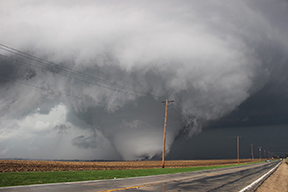Responding to Emergencies

In the Bible
Abram rescues Lot -
- When Abram heard that his kinsman had been taken captive, he led forth his trained men, born in his house, 318 of them, and went in pursuit as far as Dan (Genesis 14:14).
Ebed-melech rescues Jeremiah -
- When Ebed-melech ... heard that they had put Jeremiah into the cistern, ... [he] said to the king, "My lord the king, these men have done evil in all that they did to Jeremiah the prophet ..." (Jeremiah 38:7-9).
A Samaritan treats a robbery victim -
- But a Samaritan, as he journeyed, came to where he was, and when he saw him, he had compassion. He went to him and bound up his wounds, pouring on oil and wine. Then he set him on his own animal and brought him to an inn and took care of him (Luke 10:33-34).
Reuben saves Joseph -
- But when Reuben heard [his brothers' plot], he rescued [Joseph] out of their hands (Genesis 37:21).
A call to rescue the oppressed -
- "Rescue the weak and the needy; deliver them from the hand of the wicked" (Psalm 82:4).
Joshua comes to aid the Gibeonites -
- Then the five kings of the Amorites ... gathered their forces and ... encamped against Gibeon and made war against it. And the men of Gibeon sent to Joshua at the camp in Gilgal, saying, "... Come up to us quickly and save us and help us ..." So Joshua went up from Gilgal, he and all the people of war with him, and all the mighty men of valor (Joshua 10:5-7).
Peter urges us to be alert to danger -
- Be sober-minded; be watchful. Your adversary the devil prowls around like a roaring lion, seeking someone to devour (1 Peter 5:8).
In the News
Undisclosed location in USA, 2020 before February 19 - A natural gas company shut down one of its pipelines for a number of days after a ransomware attack. The attack came by way of an infected email. The attack was investigated by the Cybersecurity and Infrastructure Security Agency (CISA) of the Department of Homeland Security and reported in E&E News. The news report says, "According to CISA, the facility lacked an emergency response plan that considered cyberthreats."[2]
* Churches should include cybersecurity issues in their emergency plans.
Wauwatosa, Wisconsin, February 29, 2020 - A fight involving 35 persons started in the food court of a mall. Mall security responded, as well as local police, who arrested three teens.[3]
* Church safety teams also need to be ready to respond to disturbances in the church or at church events.
Charleston, South Carolina, April 19, 2020 - Lightning hit a church steeple on a Sunday afternoon, causing a fire. No one was in the building at the time. Responding firefighters limited the fire to the top of the steeple and brought it under control.[4]
* If this had happened during classes, a service, or an event, the Church Safety Team could have responded by directing an evacuation.
Austin, Texas, December 20, 2018 - A customer experienced a heart attack while sitting in an automotive dealership's sales office. The salesman immediately ran out to get help. Two other employees came in and administered CPR until EMS arrived, saving the man's life.[5]
* Many lives have been saved in churches by Safety Team members administering CPR and/or using AEDs.
Special Resource
This month's special resource is Practical Steps to Start a Safety Ministry and a DIY Security Assessment.[6] To get this free download, click here. You can also view Kris's videocast, Steps to Starting a Safety Ministry[7] by clicking here. In signing up for the download, you subscribe to future newsletters by email.
Ready to Respond
What is the most important thing we need to be ready to respond? Situational awareness. You can have all the strength, ability, knowledge, training, and equipment needed to respond, but the response itself depends on whether you are aware of the situation and the need to respond.
Situational Awareness
Situational awareness is being aware of your surroundings, including changes. This begins with knowing what and who are in the 360º around you and the 180º over you (the 540º view). If you are on an upper level, this also includes what's below, making it the 720º perimeter.
Thanks to two-way radios, surveillance cameras, and alarms, a safety team member's awareness can extend across the entire church campus. Ideally, all of our senses are inputs for situational awareness. Some of the sensations alerting us to our environment are sounds, smells, temperature, and motion. For instance, if we feel a shaking, jolt, or tipping, there is a reason. Find out whether this is a threat or not. A shaking could be a heavy truck passing, an earthquake, or something else.
The Color of Awareness
Since 2001, Americans have become used to color-coded threat levels. These were adapted from the Cooper Awareness Color Code. This color code was derived for military use, but is applicable to self-defense and security. These colors are not levels of threat, but levels of awareness. Originally four colors (White, Yellow, Orange, Red), a fifth color (Black) was added by the US Marine Corps. Here are the Colors of Awareness as adapted to Church Safety & Security:
White - Totally Unaware
This is a state of unpreparedness. If there is danger, by the time you're aware it could be too late to respond effectively. There is a time to relax, to zone out, but not when on Safety Team duty (or in public areas).
Yellow - Calm Awareness
Your senses are in gear, paying attention. Your state of mind is, "Anything can happen."
Orange - Elevated Awareness
This is like the dog with his ears up - there is something getting your attention. Maybe you heard a sound in the hall. Every sense is tuned to finding out what it is.
Red - Threat Identified
You know of a specific threat (or potential threat). You are in "What if ..." mode. What you do depends on what the threat is and how it develops.
Black - Fight or Flight
You are in it now! This is engagement or disengagement. In the military, you are in a fight. However, in church safety, you find a safe out, or you intervene. The response to a disrupter may be verbal de-escalation. To violence, the response is fight-or-flight.
Kinds of Emergencies
The kinds of emergencies are as varied as the threats we face, but they do fit into a few categories: Severe Weather, Fire Emergencies, Medical Emergencies, Missing Child, Disruptive Person, Suspicious Person, Robbery, Bomb Threats/Suspicious Package, Suspicious Substance, Active Killer, Cybersecurity Threat. (all but the first and last are discussed in the Fundamentals training course[1]). Those with training courses are noted in the footnotes.
Severe Weather and Other Natural Disasters

Not all weather is bad, but there are damaging extremes, such as strong straight winds, extreme temperatures, drought, hurricanes, tornadoes, flooding, excess snow, ice storms, blizzards, nor'easters, and lightning. Other natural disasters include landslides and sinkholes, wildfires, earthquakes, and volcanic eruptions. Be prepared to respond to the natural threats most likely to affect your church.[8]
Fire Emergencies
Ever since people began living in buildings, there has been the danger of fire. Most fires are accidental. Some are caused by lightning or wildfires, many by arson. Fire is useful when contained and controlled, but when an uncontrolled fire starts in the church, it is an emergency requiring immediate response. It may be put out using a fire extinguisher. If it cannot be controlled and put out, the building must be evacuated. Some may need to be rescued and carried out. Be ready to properly respond.[9]
Medical Emergencies
No matter how safe and healthful we make the church, there will be medical emergencies. These include injuries, heart attacks and strokes, choking, severe allergic reactions, wounds from an attack, heat stress (heat exhaustion and heat stroke), and cold stress (hypothermia and frostbite).
Missing Child

What do you do if a child in the church is reported missing? How do you look for the child? To whom do you report it? Know what to do. This is covered in the Security Team Fundamentals training course.[1]
If child abuse is discovered in the church, there are specific ways of responding to it covered in the SDCS training course Protecting Children from Abuse v4.[10]
Disruptive Person
Whether it begins with a disagreement or someone comes in angry, a disruption can happen, even in the church. Safety Team members must first try to calm the scene though verbal de-escalation.[11]
Suspicious Person
There will be times when a person arouses your suspicion, or when someone reports a suspicious person. How do you handle this? First of all, "suspicious" means that you don't know or understand what the person is doing, so this calls for tact. Maybe the person is lost, or is tourist gawking. Perhaps they are looking for something they dropped. On the other hand, there could be mischief brewing. How do you safely find out? The Security Team Fundamentals course explains five action points:
- Assess the situation
- Call for back-up before investigating
- Make contact with the person
- Cover and assist as needed
- Be kind but alert
Robbery
Different kinds of thievery can be going on then discovered, but armed robbery is an immediate emergency. Unless you see it coming, armed robbery takes you by surprise, so it pays to already know what to do.
A proactive response is best for all kinds of thievery/robbery, from embezzlement, to pilfering of loose items and cash, to burglary, to armed robbery. Try to keep items secure, encourage attenders and members to be careful, and control access. Condition your situational awareness to be alert to approaching strong-arm and armed robbers so you can take evasive and protective measures. If robbed, your first priority is safety. Lives are worth more than cash.
Bomb Threats/Suspicious Package

What if you receive a bomb threat? What if a suspicious package is found or delivered?
Bomb Threat - take it seriously. It can be mailed in, left on a note (even made on a wall with a marker), or called in. Train the staff to contact the Safety Team immediately. If called in, the staffer answering the phone should ask a few questions (they are in the course). Then the Safety Team can call 911, alert the Safety Team Leader, and look for the bomb.
Don't evacuate the building until the area outside has been checked. Be sure there's no one waiting to shoot people as they come out.
Suspiious Package - DO NOT TOUCH a suspicious package. It may be rigged to explode or release a hazardous material when moved. This may be a box, a bag, a backpack, or another container. If a FedEx or UPS box is not delivered by that company at their usual time, be careful. Bombs are made to look "normal." Train the staff to call 911 if a package is suspicious.
Suspicious Substance
How many remember the Anthrax scare in 2001? Several people died from Anthrax sent in letters and packages. There were later attempts to poison people with ricin. Train anyone working in the office or handling incoming mail to not touch any unknown material coming out of an envelope or a package. Have them alert the Safety Team and call 911.

The earlier the response to an active shooter, the better. When the security team at the New Life Church in Colorado Springs heard of the Arvada shooting and knew the killer had connections to their church, they were on the watch for him. When he began shooting in the parking lot, they set up an ambush in the foyer. He was neutralized not long after coming in.[12]
Years later, in Nashville[13] and Sutherland Springs[14], the killers began their barrage outside and continued it when they came in with no one to stop them at the door. More recently, the killer was already in the church in White Settlement when he pulled out his weapon. He was stopped in about 6 seconds.
What made the difference in these rampages is the watchfulness and response of safety/security teams. In Colorado Springs, the killer was spotted outside. In White Settlement, he dressed and acted suspiciously, so the Safety Team kept their eyes on him. In Nashville, those inside were unaware that someone was shot outside, so they didn't close and lock the door right away. In Sutherland Springs, no one was guarding the door when the assailant began shooting out windows from outside. He then came in and killed 26.
In the training course, the responses to an active shooter are for the civilians and for the Safety Team.
Civilians -
- Run
- Hide
- Fight.
Safety Team - Direct these three responses:
- Lockdown
- Containment
- Engagement
Complete coverage of this subject is presented in the SDCS training course Active Shooter Response v4.[15]
Cybersecurity Threat
Cybersecurity is a concern not only for individuals, businesses, and government agencies, but also for churches. Recently, many organizations (such as a gas company[2]) have fallen prey to ransomware, which encrypts vital files until the victim pays the hacker to unlock the files.
Train all staff to follow cybersecurity safety measures. These measures are:
- Spotting and not responding to spam emails
- Using strong passwords and keeping them confidential
- Care in websites visited and knowing what to not click on
- Keeping anti-viral and anti-malware programs up-to-date
- Backing up church files to devices not permanently connected to the church's computer system.
Conclusion
Emergencies emerge, and we have to be ready to respond. Train to be ready, beginning with the Sheepdog Church Security training course Security Team Fundamentals.[1]
There Is More
This is a four-part series. The other three articles are "What's My Role?" (Duties of a Safety Team Member), "On the Beat" (Patrolling and Monitoring), and "On the Record" (Reporting and Filing).
References
- Kris Moloney and Malene Little, "Security Team Fundamentals v4," Sheepdog Church Security Courses: Training Materials for Classes [https://sheepdog-church-security.thinkific.com/courses/church-safety-and-security-volunteer-academy-training-bundle]; Individual Online Training [https://sheepdog-church-security.thinkific.com/courses/church-safety-and-security-volunteer-academy].
- Christian Vasquez, "Cyberattack shut down gas pipeline for days — DHS," E&E News, February 19, 2020 [https://www.eenews.net/stories/1062388455].
- Evan Casey, "Video from Mayfair mall shows police and security tackling individuals and using pepper spray to break up a fight," Milwaukee Journal Sentinel, March 2, 2020; updated March 4, 2020 [https://www.jsonline.com/story/communities/west/news/wauwatosa/2020/03/02/mayfair-mall-fight-video-store-shows-moment-security-responded/4930792002/].
- Fleming Smith, "Fire breaks out at Second Presbyterian Church in downtown Charleston," The Post and Courier, Apr 19, 2020; Updated Aug 12, 2020 [https://www.postandcourier.com/news/fire-breaks-out-at-second-presbyterian-church-in-downtown-charleston/article_5c816386-826f-11ea-ae9d-270deee75f19.html].
- KSAT Staff, "Workers save man who experienced heart attack while buying vehicle," KSAT 12, December 20, 2018 [https://www.youtube.com/watch?v=z12armVz9TA].
- Kris Moloney, "Practical Steps to Start a Safety Ministry and a DIY Security Assessment," Sheepdog Church Security, © 2019 [https://sheepdog-church-security.ck.page/9c5f2d32cc].
- Kris Moloney, "Practical Steps to Start a Safety Ministry," Sheepdog Church Security, May 9, 2019 [https://www.youtube.com/watch?v=_pDaoe-wV0w].
- Kris Moloney and Malene Little, "Severe Weather and Natural Disasters v3," Sheepdog Church Security Courses: Training Materials for Classes [https://sheepdog-church-security.thinkific.com/courses/severe-weather-and-natural-disasters-training-bundle]; Individual Online Training [https://sheepdog-church-security.thinkific.com/courses/severe-weather-and-natural-disasters].
- Kris Moloney and Malene Little, "Arson and Fire Safety v4," Sheepdog Church Security Courses: Training Materials for Classes [https://sheepdog-church-security.thinkific.com/courses/arson-prevention-and-fire-drills-for-churches-training-bundle]; Individual Online Training [https://sheepdog-church-security.thinkific.com/courses/arson-prevention-and-fire-drills-for-churches].
- Kris Moloney and Malene Little, "Protecting Children from Abuse v4," Sheepdog Church Security Courses: Training Materials for Classes [https://sheepdog-church-security.thinkific.com/courses/protecting-children-from-sexual-abuse-in-the-church-training-bundle]; Individual Online Training [https://sheepdog-church-security.thinkific.com/courses/protecting-children-from-sexual-abuse-in-the-church].
- Kris Moloney and Malene Little, "Deescalating Disruptive Persons v4," Sheepdog Church Security Courses: Training Materials for Classes [https://sheepdog-church-security.thinkific.com/courses/dealing-with-disruptive-persons-using-verbal-deescalation-training-bundle]; Individual Online Training [https://sheepdog-church-security.thinkific.com/courses/dealing-with-disruptive-persons-using-verbal-deescalation].
- Wikipedia, "2007 Colorado YWAM and New Life shootings" [https://en.wikipedia.org/wiki/2007_Colorado_YWAM_and_New_Life_shootings].
- Boucher, D., J. Ebert, N. Allison, N. Rau, A. Wadhwani, and N. De Gennaro, "How the Nashville church shooting unfolded: A timeline", The Tennessean, Published 2:57 p.m. CT Sept. 25, 2017 | Updated 12:08 a.m. CT Sept. 26, 2017 [https://www.tennessean.com/story/news/crime/2017/09/25/how-nashville-church-shooting-burnette-chapel-church-christ-unfolded-timeline/700049001/].
- Wikipedia, "Sutherland Springs church shooting" [https://en.wikipedia.org/wiki/Sutherland_Springs_church_shooting].
- Kris Moloney and Malene Little, "Active Shooter Response v4," Sheepdog Church Security Courses: Training Materials for Classes [https://sheepdog-church-security.thinkific.com/courses/active-shooter-neutralization-and-lock-down-drills-training-bundle]; Individual Online Training [https://sheepdog-church-security.thinkific.com/courses/active-shooter-neutralization-and-lock-down-drills].




